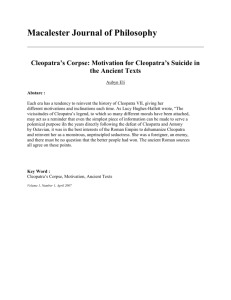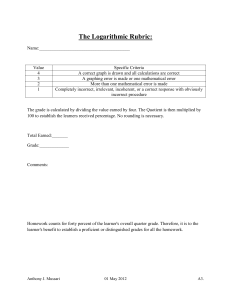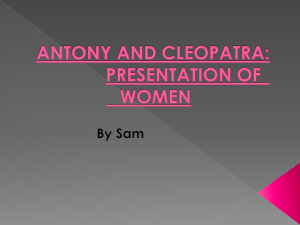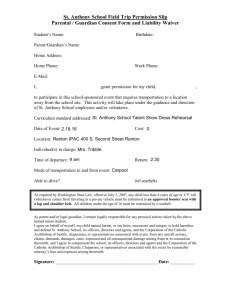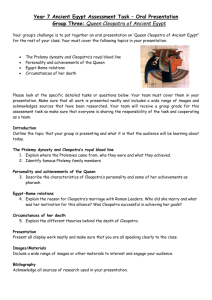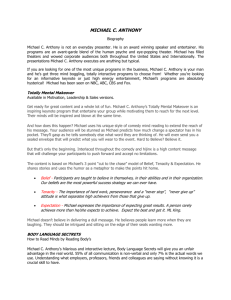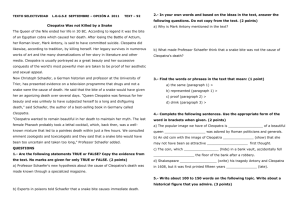Anthony and Cleopatra Ann Morris Paper
advertisement
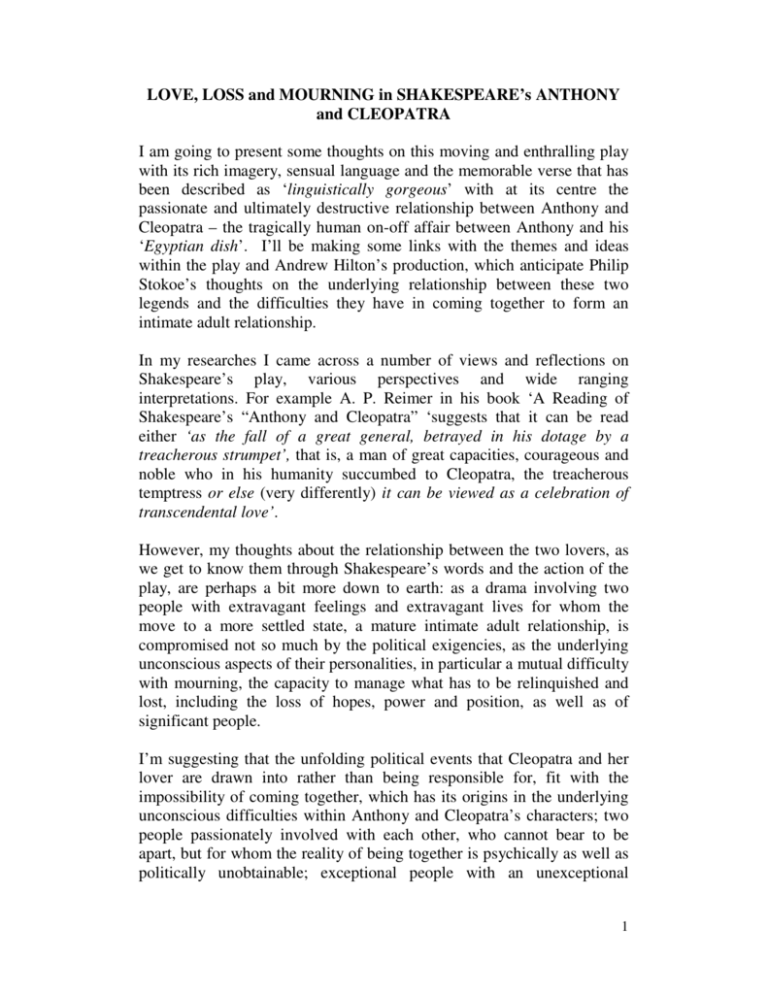
LOVE, LOSS and MOURNING in SHAKESPEARE’s ANTHONY and CLEOPATRA I am going to present some thoughts on this moving and enthralling play with its rich imagery, sensual language and the memorable verse that has been described as ‘linguistically gorgeous’ with at its centre the passionate and ultimately destructive relationship between Anthony and Cleopatra – the tragically human on-off affair between Anthony and his ‘Egyptian dish’. I’ll be making some links with the themes and ideas within the play and Andrew Hilton’s production, which anticipate Philip Stokoe’s thoughts on the underlying relationship between these two legends and the difficulties they have in coming together to form an intimate adult relationship. In my researches I came across a number of views and reflections on Shakespeare’s play, various perspectives and wide ranging interpretations. For example A. P. Reimer in his book ‘A Reading of Shakespeare’s “Anthony and Cleopatra” ‘suggests that it can be read either ‘as the fall of a great general, betrayed in his dotage by a treacherous strumpet’, that is, a man of great capacities, courageous and noble who in his humanity succumbed to Cleopatra, the treacherous temptress or else (very differently) it can be viewed as a celebration of transcendental love’. However, my thoughts about the relationship between the two lovers, as we get to know them through Shakespeare’s words and the action of the play, are perhaps a bit more down to earth: as a drama involving two people with extravagant feelings and extravagant lives for whom the move to a more settled state, a mature intimate adult relationship, is compromised not so much by the political exigencies, as the underlying unconscious aspects of their personalities, in particular a mutual difficulty with mourning, the capacity to manage what has to be relinquished and lost, including the loss of hopes, power and position, as well as of significant people. I’m suggesting that the unfolding political events that Cleopatra and her lover are drawn into rather than being responsible for, fit with the impossibility of coming together, which has its origins in the underlying unconscious difficulties within Anthony and Cleopatra’s characters; two people passionately involved with each other, who cannot bear to be apart, but for whom the reality of being together is psychically as well as politically unobtainable; exceptional people with an unexceptional 1 problem, struggling for permanence, permanence that for these lovers is only possible in death. We see that Anthony, an already fallen man, is in thrall to Cleopatra, Cleopatra is besotted with Anthony, and that these are two people who can neither live without each other nor live together. A key aspect of the play, which I think Philip will expand on later. So one question for us to consider might then be, what is the evidence from the play that might support this supposition and also, does Andrew’s production and the performances we’ve seen here at the Tobacco Factory reflect this or a different perspective? Of course Anthony and Cleopatra are players on a world stage and the struggle for power, and their feelings for each other, are entwined. They are conscious of their legendary status. Two larger than life figures, totally absorbed with each other, as we see from the violence of their frequent quarrels and the extravagant (and of course poetically wondrous) language that they use to express their feelings for each other. We as the audience are caught up as spectators curious and excited by this very public affair, wondering what is going on as Enobarbus helps us to keep track. In the ‘barge’ speech he conjures up for Agrippa and Maecenas, and of course us, Anthony’s first vision of Cleopatra and the Egyptian world he is to so totally succumb to – ‘I will tell you. The barge she sat in, like a burnished throne, Burned on the water; the poop was beaten gold; Purple the sails, and so perfumed that The winds were love-sick with them; the oars were silver, Which to the tune of flutes kept stroke, and made The water which they beat to follow faster, As amorous of their strokes.’ Act 2. 2. 200-207 Today it is in the pages of magazines like Heat Magazine and Hello that the private affairs of public couples are endlessly aired fuelling a public fascination. Jordan and Pete, Posh and Becks – it goes on. For those of us who work clinically we are also aware that in social service offices and therapy rooms couples caught up with the drama of their relationships, who find it difficult either to be together or apart, come to attention, with their children, like the affairs of state largely out of mind. Cleopatra and Anthony too, like these couples, are unable to keep hold of thoughts of 2 their own babies, their children, who we hear of only briefly later in the play. As we have seen the action of the play spans several years and moves rapidly from place to place, from Alexandria, Rome, Sicily, Actium and Athens and back to Rome and Egypt leaving us as the audience trying to catch up with ‘where the action is’, left wondering – there is concretely no settled state, no sense of constancy. This sense of unsettledness resonates with the state of mind of both Anthony and Cleopatra, and the relationship between them and we see very vividly the oscillations in thought and mood within, and between, the lovers in the performances. But whilst this compelling couple appear besotted with each other, as has been pointed out they seldom express love in the present but rather remembered from the past, and always as an ideal – ‘Eternity was in our lips and eyes, Bliss in our brows’ bent; none our parts so poor But was a race of heaven’ Act 1. 3. 36-8 These thoughts are not original and again I think the Shakespearean scholar A. P. Reimer is able to capture succinctly the dilemma of the central characters. He points out that when Anthony renounces Cleopatra and returns to Rome, he finds that his position cannot be sustained as easily as he thought and that ‘Throughout the play she (Cleopatra) struggles to fix Anthony firmly in her ‘strong toil of grace’, to keep him captive yet not passive, still the imperial Anthony who yearns for a world of action and power. But once he is trapped this emotional satisfaction is lost. Whenever he is by her side, she mocks and torments him: whenever she is assured of his loyalty, she instinctively rejects him, in a sense driving him back to Rome.’ For example Cleopatra goads Anthony saying ‘What, says the married woman you may go? Would she had never given you leave to come! Let her not say ‘tis I that keep you here. I have no power upon you; hers you are.’ Act 1.3.21-25 At the beginning of the play Anthony has neglected his military duties and is indulging himself in Egypt at the court of Cleopatra, and in Andrew’s production our first impression is of this timeless, indolent feminine world of Shakespeare’s imagination, a place for private passion and desire, full of enticements, which contrasts with the disciplined world of Rome. 3 Philo speaks of this ‘dotage of our general’s’ which in Rome is viewed as scandalous ‘His captain’s heart.......is become the bellows and the fan (arousing and satisfying) to cool a gipsy’s lust....The triple pillar of the world transformed into a strumpet’s fool.’ Act 1.1. 1,6,12,13 So Anthony’s former greatness is contrasted with his present decay and we have a picture of a man in conflict between the Egyptian and Roman aspects of himself and with his external relationships. During the course of the play we are to witness Anthony’s painfully increasing isolation. Meanwhile, however, angry and concerned Octavius wants Anthony back in Rome to help deal with the threat of rebellion from Pompey while the allure of his ‘gipsy’ is pulling Anthony in the opposite direction. (Remembering that in England in the 16th century gipsies were thought to have come from Egypt and ‘gipsy’ was also a contemptuous term for a promiscuous woman.) In the following scene the news of the death of Fulvia, Anthony’s wife, the event that precipitates Anthony’s return to Rome, is broken to him. And so at the very beginning of the play we are concerned with death and its consequences, and we observe Anthony’s response to this loss. Can he register what this loss means to him personally? Certainly he seems to return guiltily to Rome, and a Roman part of his mind, apparently avoiding the intense and disturbing emotions that the opportunity to be more fully involved with Cleopatra may have stirred up. Anthony, full of self reproach speaking of Fulvia says – ‘There’s a great spirit gone! Thus did I desire it. What our contempts doth often hurl from us We wish it ours again.’ Here Anthony expresses the wish that he had kept those things which he had thrown away in contempt. And in the same conscience stricken vein goes on ‘She’s good, being gone. The hand could pluck her back that shoved her on.’ And in this moment too there is a sense of Anthony’s guilt and regret together with some awareness of the destructive course he has been on ‘I must from this enchanting queen break off. Ten thousand harms, more than the ills I know, My idleness doth hatch.’ Act 1. 2. 129-37 However Anthony’s return to Rome and the Roman world is at the expense of any lasting capacity to stay in touch with his feelings about the meaning for him of Fulvia’s death, his loss of power and status and 4 his choice to leave Egypt and Cleopatra. The lovers’ exchanges before Anthony leaves for Rome are more serious in tone but end with the idea, expressed by Anthony, that although Anthony and Cleopatra are to be separated physically they will remain united spiritually, a retreat to another imaginary and idealised world – ‘Our separation so abides and flies That thou, residing here, goes yet with me, And I, hence fleeting, here remain with thee.’ Act 1. 4. 104-6 Anthony cannot think about what giving up his place at Cleopatra’s side involves, he cannot mourn the loss of his Egyptian world, the loss of the idyll that he and Cleopatra have shared and he pre-empts the envious and jealous feelings that moving away from his Egyptian queen give rise to with recourse to fantasy. For Cleopatra this move to Rome and its associations is an unforgiveable betrayal and she has no internal resources to manage the loss of her exclusive place in Anthony’s mind. Being in an intimate relationship involves bearing the difficult feelings of envy, love, hate and dependence and managing the loss and disillusionment associated with coming to terms with the discrepancies between the idealized love object and the actual characteristics of a partner, in order to be able to attain lasting contentment. In his paper ‘The Aim of Psycho-Analysis’ the psychoanalyst Roger Money-Kyrle (drawing on the work of Melanie Klein) is concerned with the importance of the internalization of the first good object, the good breast, and the capacity to mourn to the favourable development of the personality. Quote ‘...the capacity to mourn, or pine for a loss, and the capacity to remember the lost object are inseparably linked. Without the memory there can be no mourning, and without the mourning there can be no memory.’ Later in the paper he expands on the significance of the first good object ‘Where there has been a favourable development, and the concept of the first good object is well established, together with the capacity to remember it with love, there is far less difficulty in being able to recognize the parental relation as an example of the innate preconception of coitus as a supremely creative act’.......he goes on ‘But where the development has been unfavourable, the mis-conception of intercourse as a by-product of fantasies of total projective identification will remain as a nodal point for the development of every form of perversion and insanity’ - emphasising that early difficulties in the beginning of linking up with an 5 object impede the necessary development of the capacity to become part of a couple. Of course Shakespeare’s play doesn’t give us any direct evidence concerning the external figures in the early environment of Anthony and Cleopatra, or of their internal objects, and he also omits from the drama some of the more disturbing aspects of the historic lovers’ characters, including their cruelty and murderousness, their ‘perversion and insanity’. However anyone who saw the recent BBC programme ‘Cleopatra, Portrait of a Killer’ will be aware of some of the known and inferred aspects of the historic Cleopatra’s early environment; the murderous queen of the Nile whose own mother’s origins are uncertain and who went on, in keeping with her imperial status, to marry her brothers, the boy kings Ptolemy XIII and XIV, the ‘Queen of Ptolemy’ Act 1.4.6 that Caesar refers to, and who later, in order to guard her own self interest and secure her place on the throne of Egypt, also orders Mark Anthony to instigate the murder of her sister Arsinoe. In Shakespeare’s play we do nevertheless see evidence of a particular sort of insanity. The lovers seem largely preoccupied with the narcissistic satisfactions of their relationship, excited by their involvement with each other, living a life of luxury and self indulgence but unable to face reality – personally and politically. Cleopatra, of whom it is said that ‘th’air, which, but for vacancy, had gone to gaze on Cleopatra, too, and made a gap in nature.’ Act 2. 2. 226 is in love with Anthony the invincible general not a defeated Anthony. Anthony is captivated by the goddess of the Nile, not the Cleopatra who will be a captive of Octavius. A couple who are only on stage briefly alone together, and who seem in love with the idea of being in a relationship whilst avoiding the fears of actually being in a permanent relationship, with all the anxieties that becoming part of a couple psychically involves. This excited, but defensive, way of relating helps Anthony and Cleopatra to avoid the task of facing reality and loss, of becoming separate individuals in themselves, of reclaiming parts of themselves from each other, rather than resorting to excessive projection into each other. It is evident that Cleopatra exercises tremendous power over Anthony who we see in the play as a flawed and reduced man, not the once powerful, outstanding noble figure that is spoken of. Anthony was cruel and irresponsible, but by involving himself in the narcissistic world of his relationship with Cleopatra, their oneness serves to deplete his character, but also enables him to avoid owning the more disturbing destructive aspects of his personality. 6 If we understand normal mourning as a conscious response to facing an actual loss or disappointment, with all the painful emotional work that is involved, and pathological mourning as more to do with the unconscious, the situation in which the individual ‘cannot consciously perceive what he has lost’, a state of being associated with a profound diminution in selfesteem, described by Freud in his classic paper ‘Mourning and Melancholia’ it is also possible to be mindful of the different conscious and unconscious manoeuvres, including denial, idealization, and the use of manic defences, that are employed to avoid the painful work of mourning. In normal mourning, when it is possible to acknowledge the loss, there can be a working through of the experience over time, and consequent enrichment of the mourner who, having given up the lost object, is then available for new relationships and new possibilities. However, the capacity to mourn is very dependent on the mother’s ability to handle separation with care, to wean her baby gently and to bear the associated feelings that are stirred up, such as anger, guilt and sadness. When the mother is either emotionally absent, or unable to bear sadness, the baby has an experience which leaves them with a sense that such feelings are unbearable and cannot be worked through, giving rise to phantasies about the reasons for the loss which are then a source of further anxiety. Depressive anxieties about damaging or exhausting the object are largely absent from the play. However, persecutory fears that may leave the baby feeling unloved or unwanted, do find an echo in Cleopatra’s feelings about what goes on in Rome, and in the Roman part of Anthony’s mind from which Cleopatra feels excluded – ‘He was disposed to mirth, but on the sudden A Roman thought hath struck him.’ Act 1.2.87 For Cleopatra it is thoughts of Rome, and early in the play thoughts and reminders of Fulvia, Anthony’s wife, her perceived rival, that stir up Cleopatra’s jealousy and possessiveness. ‘Fulvia perchance is angry’ Act 1.1.21 or we might imagine Cleopatra is angry, to be reminded of Fulvia, Rome and those aspects of Anthony’s life and loves she is excluded from. So what do we observe when these legends are faced with loss? The play is framed by the death of Fulvia, and Anthony’s reactions to this event at the beginning of the play, which I’ve touched on, and at the end of the play, Cleopatra’s lengthy preparations for her own dramatic death by suicide, following Anthony’s death, the humiliation of her defeat at sea and the realisation that she will not again be able to ‘pack cards with 7 Caesar’. Act 4.14.19 In turn Anthony and Cleopatra are confronted with real external loss with personal and political implications, but ‘cannot (repeating Freud’s words) consciously perceive what he (they) has lost’. As Anthony lies dying Cleopatra speaks movingly of the meaning of his loss to her – ‘Hast thou no care of me? Shall I abide In this dull world, which in thy absence is No better than a sty?..........the odds is gone And there is nothing left remarkable Beneath the visiting moon.’ Act 4. 15. 63-69 However after Anthony’s death this depth of feeling is not sustained, perhaps partly out of guilt since Cleopatra’s own actions played a part in Anthony’s death. She then gives some of her most passionate speeches about her lover pointing to the fantasy that sustained their relationship. Her vision of Anthony is one we never see in the play, but for a while we are transported into another world, away from the humiliation that awaits Cleopatra in Rome, and instead we are captivated by the Anthony of Cleopatra’s imagination ‘I dreamt there was an emperor Anthony.’ Act 5.2.75 ‘His legs bestrid the ocean; his reared arm Crested the world; his voice was propertied As all the tuned spheres, and that to friends; But when he meant to quail and shake the orb, He was as rattling thunder.....’ Act 5.2. 81-85 A vision that Cleopatra wants to acquire and incorporate. Cleopatra then turns to Dolabella ‘Think you there was or might be such a man As this I dreamt of?’ Dolabella replies ‘Gentle madam, no.’ Act 5.2.91-93 At this point Cleopatra is confronted with, but she is unable to bear, the truth of Dolabella’s words, to face reality and to mourn the idealised relationship of her imaginings. Faced with loss of power and haunted by the possibility of her humiliation in Rome, and life under Roman rule, she has recourse to fantasy or death 8 ‘Of censuring Rome? Rather a ditch in Egypt Be gentle grave unto me! Rather on Nilus’ mud Lay me stark naked, and let the water-flies Blow me into abhorring!’ Act 5.2. 56-59 So, with a determination to die, at the end of the play Cleopatra stage manages her own death (which the historic queen had rehearsed many times using slaves as understudies) and, wearing her crown and dressed in her queenly robes to help confirm her belief that she is a triumphant, not a defeated woman, speaks with a magnificent outpouring of emotion of the ‘Immortal longings in me.......and later ‘Husband, I come! Now to that name my courage prove my title!’ Act 5. 2. 280, 286. However, Cleopatra has died in near-triumph, not triumph. The impossibility of sustaining her precarious internal state, since she is unable to face the loss of her idealized relationship with Anthony, and her loss of pride and power, as well as the impossibility of maintaining her place in the external world have exhausted her. Quoting Reimer ‘the diadem reminds us that she has not attained full perfection…..the magnificence of Cleopatra’s death is already a thing of the past, a fragment of the memory. …the fate of the great lovers is virtually forgotten and seems unimportant. But as she approaches death she has become nearer to becoming ‘a gipsy in a new sense, and with a deeper meaning, an outcast of society, hunted and finally destroyed.’ After Cleopatra’s death the world continues but the play soon ends. Egypt is lost to the Roman world, to Octavius Caesar’s empire and we are, I think, reminded of the ‘Hello magazine’ part of our minds which has hunted Cleopatra and her lover. The lovers have been unable to mourn the idea that they are the only two in the world and Cleopatra has retreated to an illusion of immortality which we are subsequently moved and affected by, since the plight of Anthony and his queen is one we know about, the difficult task of facing reality, internal and external, and the painful work of mourning. Ann Morris 9
